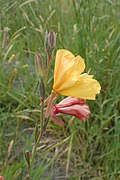| Oenothera stricta | |
|---|---|
 | |
| Close-up of flower | |
 | |
| 'Sulphurea' cultivar | |
| Scientific classification | |
| Kingdom: | Plantae |
| Clade: | Tracheophytes |
| Clade: | Angiosperms |
| Clade: | Eudicots |
| Clade: | Rosids |
| Order: | Myrtales |
| Family: | Onagraceae |
| Genus: | Oenothera |
| Species: | O. stricta |
| Binomial name | |
| Oenothera stricta | |
| Synonyms [1] | |
List
| |
Oenothera stricta, the fragrant evening primrose (a name it shares with other members of its genus), is a species of flowering plant in the family Onagraceae. [2] It is native to the Desventuradas Islands, Chile, and southern Argentina, and it has been introduced to many locations around the world. [1] The unimproved species is available from commercial suppliers, as is a cultivar, 'Sulphurea'. [2] [3] The Royal Horticultural Society considers both to be good plants to attract pollinators. [2] [3]






